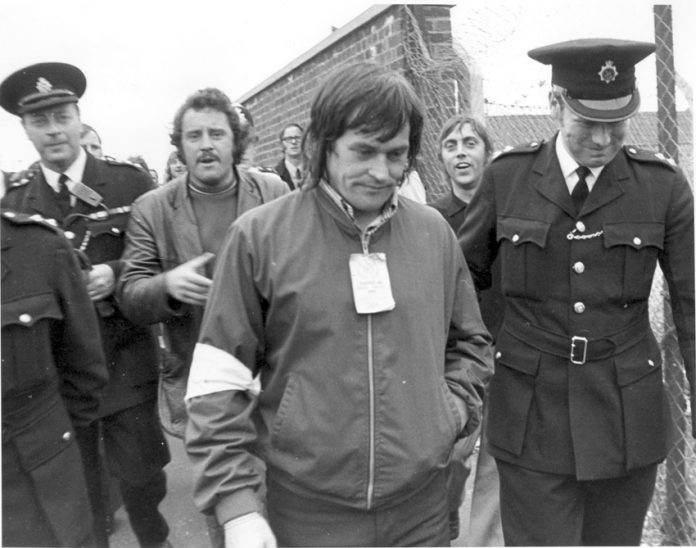
TODAY is the 40th anniversary of the release of the Pentonville 5 dockers when the TUC was forced to call a general strike and nearly brought down the Heath Tory government.
The Pentonville 5 were TGWU London dockers who were arrested and jailed in July 1972 in Pentonville prison.
They were Conny Clancy, Tony Merrick, Bernie Steer, Vic Turner and Derek Watkins.
The dockers had come out on a national unofficial strike to defend their jobs which were threatened by the introduction of containerisation on the docks.
This was in defiance of Tory anti-union laws, the National Industrial Relations Act.
Dockers at the Chobham Farm container depot, Temple Mills, Newham had taken unofficial strike action, and were picketing the site.
The National Industrial Relations Court (NIRC) had issued an injunction barring further picketing, following an application by Midland Cold Storage Company.
But picketing continued despite the injunction.
The five shop stewards were named by private investigators for the cold storage company and warrants were issued by the court for their arrest for contempt of court.
The five stewards had been brought before the newly invented National Industrial Relations Court for refusing to obey a court order to stop picketing the container depot in East London.
They were found guilty of breaching the National Industrial Relations Act that outlawed closed shops, sympathy strikes and action in support of trade unionists and they were imprisoned on July 21 1972.
The reaction among the whole trade union movement was to come out on strike and support them.
Following their arrest, a rolling series of strikes began to cause work stoppages until there was virtually an unofficial national strike.
This forced the TUC General Secretary, Len Murray, to call for an official national general strike on 31 July, demanding the release of the five shop stewards.
Thousands of striking workers marched through North London to Pentonville Prison.
The Five were released within a week of their arrest when, in response to the general strike, the Tory government invented a never-before-heard of Official Solicitor.
He was described as a court official who represents those were are unable to represent their own interests.
The appointee Norman Turner, on receipt of the papers, successfully applied to the Court of Appeal to overturn the arrest warrants, on the grounds that the National Industrial Relations Court had insufficient grounds to deprive them of their liberty, and that the evidence of the private investigators was insufficient.
This was despite the fact that the National Industrial Relations Court allowed no appeal on the question of fact, appeals were only allowed on the interpretation of the law.
The five dockers were released!
Subsequently docks shop steward, Vic Turner, continued to work on the docks, transferring from the Royal Docks to Tilbury.
During this period he was also presented with the Transport and General Union Gold Medal for his work for the union.
The events took place against the background of a clash between the Heath government and the trade union movement, involving the first national miners’ strike in Britain since 1926, with mass picketing, and clashes between police and workers.
The release of the five dockers was a massive working class victory.
It nearly brought down the Heath government and on the 40th Anniversary of this great struggle, it shows that the great strength of the working class could not be beaten by the Tory government and the ruling class.